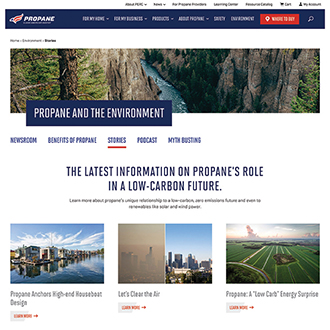Industry leaders push propane’s environmental benefits
When one California marketer received word late last year that local leaders were considering a gas ban on new residential and commercial building construction projects, he went to work – by presenting the benefits of propane to the city council.

New tools and resources from industry leaders aim to establish propane’s role in a clean-energy future. (Image: Yuliia/iStock / Getty Images Plus/Getty Images)
Talk in the Northern California city of Arcata centered on banning the use of natural gas in 2025, says Ben McWhorter, part owner of Sequoia Gas, with offices in Arcata and Fortuna.
With reach codes – local building energy codes that extend beyond state minimum requirements – targeting natural gas and propane in favor of electricity in some California cities, McWhorter couldn’t stand idle and watch potentially new regulations zap the lifeblood from his family’s third-generation business.
“For us, it was the precedence of what they’re trying to do,” he says.
With assistance from the Western Propane Gas Association, McWhorter and Sequoia Gas presented to the local leaders – speaking from a local business perspective and from a propane industry perspective. McWhorter shared information about propane, such as its reliability as a backup power source in a state that has faced widespread blackouts.
“It ended up being a good meeting,” he says. “It was a good educational opportunity for the council. They [recorded] that, so there were a lot of people sitting at home watching. It was an opportunity to get our message out to the public.”
The city, McWhorter says, reassured him that it wouldn’t include propane in the ban.
“They hadn’t passed anything, but it didn’t mean that propane was off the table,” he says. “Being there made it to where propane was off the table.”
Gas ban scenarios are unfolding across the country. At the National Propane Gas Association’s (NPGA) board of directors meeting in February, industry leaders presented on the need to address the electrify-everything movement, as well as the municipalities proposing gas bans or choosing certain energy sources over others. NPGA, as part of a gas bans coalition, lists 16 cities, all but one in California, that have enacted pro-electrification/anti-natural gas policies, and is tracking dozens of others considering similar policies across the country.
In light of this pro-electrification push, propane industry leaders are rallying together against the gas bans and rolling out new tools and resources to help educate marketers and outside audiences about propane’s role in the environment and in a clean-energy future.
“We have a great story to tell,” says Leslie Anderson, president and CEO of the Propane Gas Association of New England, a region facing similar threats. “We just have to get our message out there.”
PERC’s part
The Propane Education & Research Council (PERC) has taken steps over the last five years to explore the most impactful ways for the industry to address propane and the environment.

PERC environmental webpage image courtesy of PERC
PERC began to see a fundamental shift in consumer sentiment toward protecting the environment and a greater push by policymakers to draft climate-related legislation.
The council convened thought leaders in Baltimore last year to discuss propane industry messaging related to the environment and to create awareness about how the industry needed to talk about its role in a clean-energy future.
“From that conversation, things started rolling,” says PERC President and CEO Tucker Perkins.
PERC formed an environmental task force to explore propane industry messaging and gauge how well it communicates its environmentally friendly benefits to audiences. The council decided it could improve in this area.
“Our council directed us to increase propane’s voice in the national energy conversation, so we started to think about what tools we could use to do that,” says Tina Wilson, senior vice president of communications at PERC.
PERC worked to launch an environment-focused webpage at propane.com that offers scientific data to explain propane’s environmental benefits.
“Now we have the increased ability to at least talk to those people about why using propane is a sound environmental choice and go deeper if people are trying to learn about what fuels can be part of a good environmental choice,” Perkins says.
“Path to Zero” podcast
A new podcast called “The Path to Zero” is one key tool in PERC’s overarching, $900,000 environmental thought leadership effort to become part of the national energy conversation.
The goal of the podcast, Wilson says, is for Perkins to educate and engage in an open dialogue with guests about the environmental benefits of propane and a clean-energy future. Guests whom Perkins plans to welcome include academics, architects, engineers, chamber of commerce members and reporters. Discussion topics include climate change, conservation, environmental justice and human health.
“We’re trying to engage with thought leaders and community leaders, with people who share our views or completely oppose our views, in a thoughtful conversation about how to improve the climate and how to do it in a way that is fair to customers and the community,” says Perkins.
Some of the guests, he says, might not know about low-carbon fuels like propane, how they “can have a seat at the table and achieve the goals they’re trying to achieve.”
This “distinct group of people” is speaking to core environmental issues, teaching it, writing about it, and can help put propane on a “Path to Zero.”
“To me, it’s a very meaningful topic,” says Perkins, when asked about what the podcast title means to him. “Most everybody wants to talk about zero carbon and zero greenhouse gas emissions. For me, when you talk about climate and health, you have to talk about three contributors: particulate matter, NOx emissions and greenhouse gases.
“The Path to Zero talks about how using a low-carbon fuel like propane brings positive impacts, not just to traditional climate change concerns around greenhouse gases but to community health around particulate matter and NOx emissions.”
Marketer specific
For years, Perkins says, PERC has tried to help marketers talk with customers and potential customers about the features of propane.

Propane’s role as a reliable backup power source is one of the many positive messages the industry can share in conversations. (Image: dsmoulton/iStock / Getty Images Plus/Getty Images)
“Now we really have to speak to clean. Clean can mean healthy and environmentally beneficial,” he says. “We are one of the few fuels that can use those words in the same sentence about powerful, portable, versatile and economical.”
PERC had planned to continue this conversation – on a national and international level – at April’s NPGA Southeastern Convention & International Propane Expo in Nashville, Tennessee, but the coronavirus pandemic forced NPGA to cancel the show.
Without the industry’s largest trade show taking place this year, PERC looks to educate marketers – and other audiences – through the podcast, webinars and conversations with NPGA and the state propane associations, Wilson says.
The environment-based webpage is central to this push. The webpage offers a host of tools and resources for visitors, who may fall under several categories: propane users or prospective users; influencers; and propane marketers.
PERC wants to ensure that marketers know about the tools and resources available to help them talk to customers, prospective customers and employees about the environmental impacts of using propane.
“They need to be prepped so they can speak to their Rotary Club, Little League friends, prospective customers when somebody comes in and says, ‘I’m interested in putting in grain drying on my farm, and I want to make the right choice for the environment,’” Perkins says. “They need to have that answer.”
The webpage houses a newsroom section devoted to communicating facts and telling stories about propane and the environment; a “myth busting” tab that lists 10 myths about propane (e.g., “Propane is not safe for the environment”); and the podcast.
PERC also offers an environmental toolkit for marketers and state association leaders through its Resource Catalog.
By clicking on the Resource Catalog tab at propane.com and then on the “2020 Environmental Kit – Collection” link under its featured resources, marketers can access a number of tools that will help them connect with different audiences about propane. These tools include letters to the editor, guest columns, social media posts, event tips and talking points. The council is also working on an industry training program about environmental messaging.
In addition to PERC’s offerings, NPGA is fighting electrification with a number of documents and resources available on its member dashboard at npga.org.
Sequoia Gas’ McWhorter sees environmental issues as the No. 1 concern in California. But he also wants marketers across the country to stay on high alert about decisions being made at their local level because “getting to the table” early will prevent a larger struggle later.
“We can be the solution for a lot of problems,” he says. “It’s a matter of getting out there and pushing the word.”
















